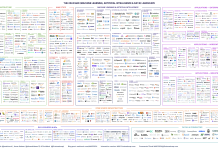Richard Leslie, CEO, The Sourcing Hub, discusses why the COVID-19 pandemic and Brexit could create a boom in outsourcing technology development
It goes without saying that Brexit will have a noticeable impact on the flow of skilled international workers available to businesses in the UK. Britain’s tech industry, in particular, will have real concerns about their ongoing capacity to meet their operational requirements and continue scaling.
Skilled workers from the EU have, for many years, helped to plug the talent shortage in the domestic labour market. In fact, the digital tech sector boasts an outsized proportion of overseas workers compared to the aggregate levels seen across the rest of the UK’s economy. Nationally, this figure stands at around 13%, reaching almost one-third (31%) in London.
The situation has become even more complicated under the shroud of the COVID-19 pandemic. Since the beginning of the pandemic and its associated lockdowns, businesses everywhere have been forced to adapt to remote working structures. And while the path ahead is still somewhat uncertain, this presents an obvious opportunity that firms would be wise to explore.
Most businesses have established seamless digital practices to maintain operations through the pandemic. Early bumps in the road, on a resourcing and infrastructural level, have been largely resolved with common best practices. Videoconferencing and software solutions that allow employees to replicate the collaboration of the physical workplace mean it is no longer necessary to maintain in-house teams in every department. IT development is one key area where moving all, or part, of operations overseas may prove a significant and much-needed efficiency.
The removal of barriers to international labour markets will allow firms to access the skilled labour their operations require, without being forced to compromise on quality. Such flexibility will be welcomed by entrepreneurs and business leaders as it will, in turn, allow them to be more agile in plugging internal skills gaps in response to changing market conditions.
UK businesses with tech and IT development needs would be wise to consider these benefits. Indeed, at The Sourcing Hub we have noticed a sharp increase in enquiries from British firms looking to outsource part, or all, of their tech operations. Unexpectedly, the twin forces of COVID and Brexit have conspired to form ideal conditions to streamline operations and access more abundant labour markets.
What you need to consider when outsourcing
There are a number of common pitfalls businesses fall into when outsourcing to external service providers. While transitioning in-house teams to a remote environment will have been second nature to many tech organisations, integrating overseas teams seamlessly is a different challenge altogether. The potential upsides will seem attractive, but it is crucial that businesses follow these best practices to ensure the perfect fit.
-
Avoid the cheapest option
There is no denying that the most appealing aspect of outsourcing tech development overseas will be the impact on costs. The smaller overheads and reduced fixed costs associated with teams from emergent tech hub economies, for example in Eastern Europe or Asia, can produce high quality output for a comparatively small price.
The benefits are clear – so it may even be tempting to go too far to make the largest saving possible. I believe this is unwise. Finding the right balance between costing and quality is crucial, so ensuring a positive relationship will require not only careful due diligence, but in some cases looser purse strings.
-
Experience is crucial
Experience matters. You should evaluate potential external service providers joining your team just as you would a prospective in-house employee – so don’t be afraid to check they can demonstrate their capacity to produce the outcomes you want.
I would encourage businesses to select vendors based on two factors: firstly, their case studies evidencing an ability to create the tech you need, as well as examples of positive relationships with other firms in your industry. Demonstrable tech and sector experience will help you to review the developer’s work within the specific context of your business needs – make sure they tick both those boxes.
Online reviews and feedback should also be easy to find – particularly if it is negative. A quick internet search should be able to offer a good impression of a vendor’s history, including an insight into their past projects and results, and their track record for quality and reliability. Further, third parties such as The Sourcing Hub exist to do much of this legwork for clients – we can identify the ideal vendor based on our pre-vetted list of technology partners.
-
Find the perfect fit
Many businesses will focus on the importance of finding the right technical fit, while inadvertently ignoring the value of a good cultural fit. While ensuring that vendors tick the rights skills, experience and abilities is a crucial first step, businesses should also be on the lookout for partners that align with their organisation’s culture and values.
Before you commit to outsourcing overseas, it is crucial to ensure you will be able to communicate efficiently and share values and goals between your separated teams for the duration the relationship. Be aware of teams who are, for example, misaligned with your style of communication and do not seem passionate about achieving standout results. A mutual understanding of the needs and broader mission of your teams will go a long way to developing a fruitful relationship.
Outsourcing will become an increasingly attractive idea for many businesses who need short term savings without compromising on quality. By carefully assessing prospective partners before making a commitment, companies in the UK will not only benefit from international talent, but in turn also retain their competitive advantage in the global market.











